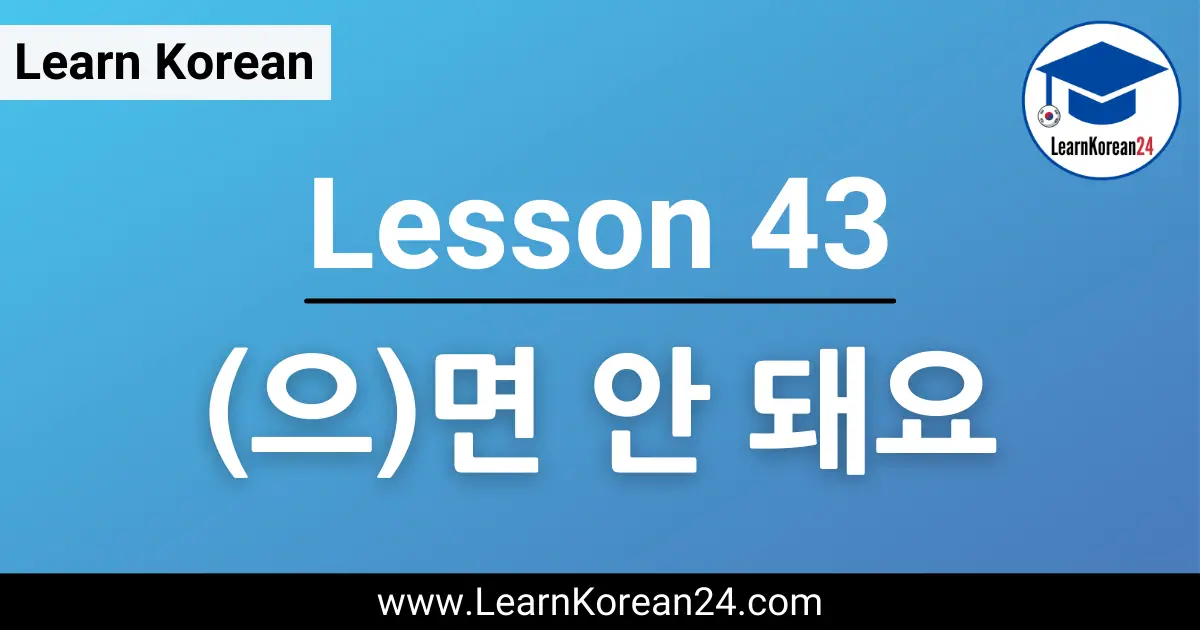Lesson 43: (으)면 안 돼요
In this lesson, you will learn how to use the structure (으)면 안 돼요 to express the prohibition or limitation of something. By the end of this lesson, you will be able to say things like, “You may not park here.“, “You should not throw away the garbage.“ etc.
Lesson 43: (으)면 안 돼요
The structure (으)면 안 돼요 is similar to ‘may not’, ‘is/are not allowed to’, or ‘should not‘ in English. This structure is the opposite of 아/어/여도 돼요 that you learned in the previous lesson. (으)면 안 돼요 is used to express prohibition or limitation of a certain action. Let’s look at some examples.
가다 = to go
가면 안 돼요. = You may not go.
크다 = to be big
크면 안 돼요. = It shouldn’t be big.
먹다 = to eat
먹으면 안 돼요. = You may not eat.
작다 = to be small
작으면 안 돼요. = It shouldn’t be small.
말하다 = to speak
말하면 안 돼요. = You may not speak.
The structure (으)면 안 돼요 is made up of the following parts:
- (으)면 = ending that means ‘if‘ or ‘when‘
- 안 = negative adverb
- 돼요 = present form of the verb 되다 which means ‘to function/work’ or ‘to be okay’.
So, (으)면 안 돼요 literally means ‘if you do it, it’s not okay‘, and is used when you want to say “may/should not” in Korean.
Conjugation Rules
When attaching (으)면 안 돼요 to verbs or adjectives, you must choose either 으면 안 돼요 or 면 안 돼요. The one you use depends on whether the verb ends in a consonant or a vowel. See the table below.
| Conjugation Rule | Examples |
|---|---|
| Verb Stem Ends In Consonant + 으면 안 돼요 | 먹다 (to eat) → 먹으면 안 돼요 작다 (to be small )→ 작으면 안 돼요 |
| Verb Stem Ends In Vowel + 면 안 돼요 | 가다 (to go) → 가면 안 돼요 크다 (to be big) → 크면 안 돼요 |
Things To Note
(으)면 안 돼요 can be used in the double negative form, which is ~지 않으면 안 돼요. This structure literally means ‘if you don’t do it, it’s not okay’, and so it is used when you want to say “You must do (something).” ~지 않으면 안 돼요 is used when you want to emphasize that a particular behavior must be performed. Here are some examples:
내일 시험이 있어서 오늘 공부하지 않으면 안 돼요.
= Because I have an important test tomorrow, I must study today.
10분 후에 콘서트가 시작해요. 지금 화장실에 가지 않으면 안 돼요.
= The concert starts in 10 minutes. You must go to the bathroom now.
Example Sentences
이거 먹어도 돼요? = May I eat this?
아니요, 먹으면 안 돼요. = No, you may not eat it.
저기요. 여기에 앉아도 돼요? = Excuse me. May I sit here?
앉으면 안 돼요. 친구가 곧 올 거예요. = You may not sit down. My friend is coming soon.
저기에 주차해도 돼요? = May I park over there?
식당 입구라서 주차하면 안 돼요. = It’s the restaurant entrance, so you should not park there.
여기에 쓰레기를 버리면 안 됩니다. = You are not allowed to throw away garbage here.
아, 죄송합니다. = Oh, I’m sorry.
선생님, 수업 시간에 영어로 질문해도 돼요? = Teacher, may I ask a question in English in class?
안 돼요.* 한국어로 질문하세요. = No, you may not. Please ask questions in Korean.
*(으)면 안 돼 can be shortened to 안 돼요 when answering a question.

